Resin-bound gravel installations in the UK must meet specific regulatory standards. Current REACH regulations require proper training for handling diisocyanates, whilst SUDS compliance ensures proper drainage and environmental protection. You’ll need BBA certification to verify your materials meet British safety standards – think of it as a quality stamp for your driveway or patio project.
The key to a compliant installation lies in proper groundwork preparation and structural support. Much like building a house, the foundation is crucial. A solid sub-base prevents sinking and cracking, whilst correct mixing and application of materials ensures your surface will last for years.
Regular updates to these regulations occur, so it’s worth checking with local authorities before starting any installation. Most councils now require permeable surfaces for new driveways to prevent flooding, making resin-bound gravel an ideal choice when properly installed.
Key Takeaways
Essential UK Regulations for Resin-Bound Gravel
Since August 2023, all installers must complete training in diisocyanate handling – these are the chemicals found in resin binders. Think of it like getting a licence to work with specialised materials.
BBA certification proves your system meets British building standards. It’s similar to having an MOT for your installation methods – without it, you’re not road-legal, so to speak.
SUDS compliance is non-negotiable. Your installation must let rainwater drain naturally through the surface, much like a giant sponge, to prevent localised flooding and protect the environment.
The basics must be spot-on: a solid sub-base (typically MOT Type 1 aggregate), correct thickness (usually 18-20mm), and regular quality checks throughout. It’s like building a house – get the foundations wrong, and nothing else matters.
For environmental impact, choose materials wisely. Local aggregates reduce transport emissions, whilst modern resin systems often include recycled materials. Every installation should aim to leave the smallest possible carbon footprint.
Overview of REACH Regulations and Training Requirements
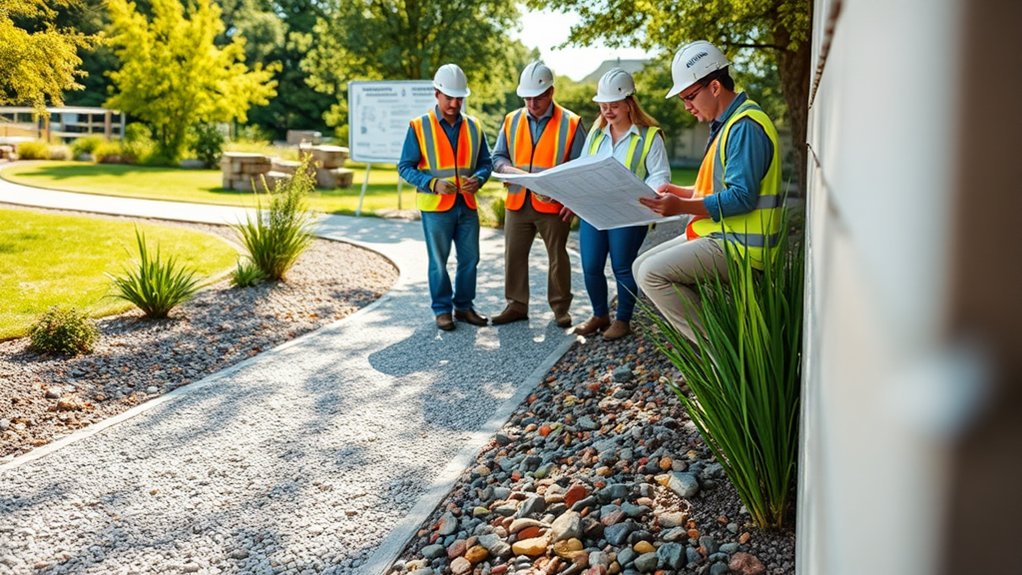
Understanding REACH regulations is essential for resin-bound gravel installers, particularly when working with diisocyanates. Since August 2023, UK law requires all contractors handling materials with over 0.1% monomeric diisocyanates to complete mandatory training.
The training covers crucial safety aspects:
- Risk assessment procedures
- Safe handling techniques
- Proper use of PPE
- Emergency response protocols
Working without proper certification puts you at risk of hefty fines and could stop you from trading. To stay compliant, you’ll need regular audits and refresher training. Additionally, adherence to BBA approval ensures that the materials used meet rigorous quality standards, further enhancing safety and longevity.
It’s not just about ticking boxes – proper handling of diisocyanates directly affects both your safety and the quality of your resin-bound installations.
Think of it like getting your driving licence – you wouldn’t operate a vehicle without one, and the same applies to working with these chemicals. Your certification proves you’re qualified to handle these materials safely and professionally.
Importance of SUDS Compliance in Resin-Bound Installations
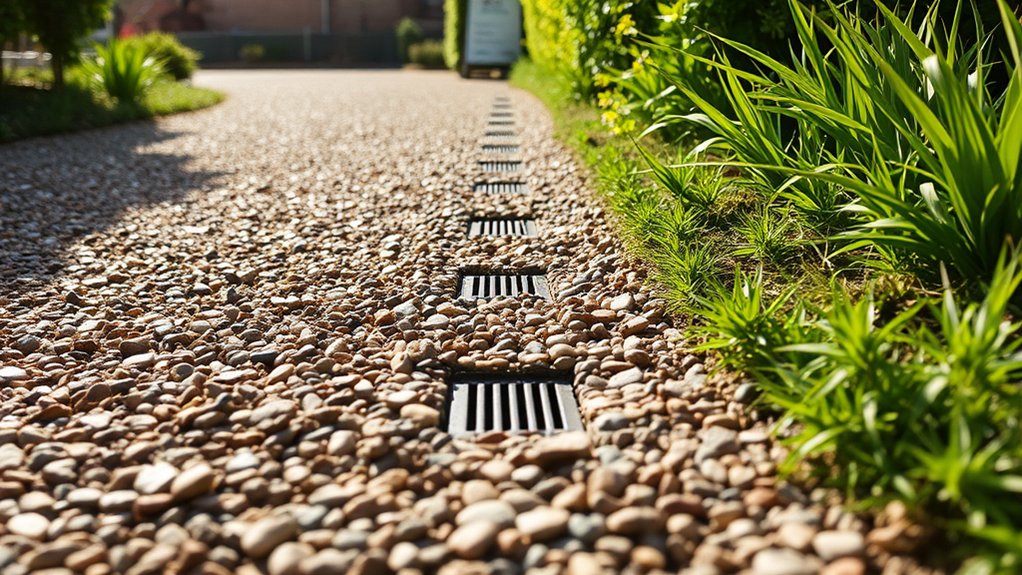
SUDS compliance plays a vital role in resin-bound installations across the UK, affecting both environmental protection and legal requirements. A properly installed system allows rainwater to drain naturally through the surface, significantly reducing local flood risks.
Think of it as creating a giant sponge that helps water return to the ground, rather than overwhelming storm drains.
The porous structure of resin-bound surfaces manages rainfall effectively, particularly important in British weather conditions. This helps maintain natural water cycles and prevents strain on urban drainage systems – especially crucial during heavy downpours common to the UK climate. To meet SUDS standards, installations must include: – Permeable base layers – Proper drainage calculations – Sufficient water flow capacity. Additionally, adhering to REACH regulations ensures that the materials used are safe for both applicators and the environment.
These requirements ensure your installation not only meets current UK regulations but delivers lasting performance and value for money. Additionally, experienced staff are available for consultations to ensure compliance with SUDS standards during the installation process.
It’s not just about ticking boxes; it’s about creating sustainable surfaces that work with nature, not against it.
Understanding BBA Certification and Its Significance
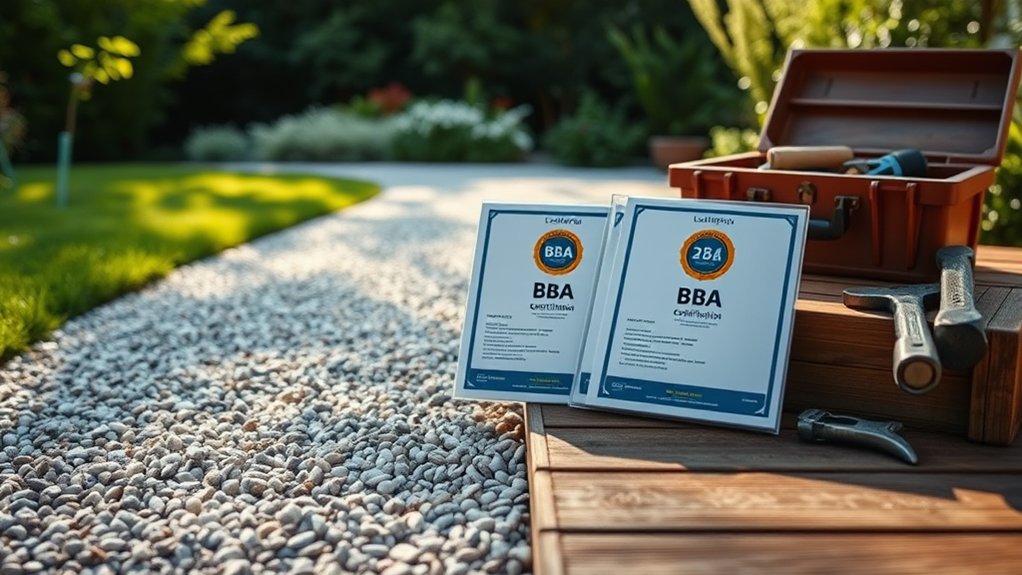
BBA certification plays a vital role in the UK construction industry, particularly for resin-bound gravel systems. The British Board of Agrément (BBA) puts products through extensive testing to ensure they meet strict quality and safety standards.
Think of it as a seal of approval, much like the MOT for your car. Using BBA-certified materials means your installations are backed by thorough technical assessments and real-world performance data. It’s particularly important when working on public projects or high-end residential jobs where quality assurance is non-negotiable. Additionally, these products offer impartial information that complements technical data, further ensuring their reliability. Furthermore, using UV-stable resin ensures that the material can withstand the harsh British weather conditions.
Choosing BBA-approved products offers clear benefits:
- Protection against product failure
- Compliance with UK building regulations
- Enhanced reputation with clients and contractors
- Easier approval from local authorities
For installers and builders, it’s simply good business sense to stick with BBA-certified materials – they’re tried, tested and trusted across the industry.
Importance of BBA Certification
Quality assurance stands at the heart of UK construction, particularly for resin-bound gravel systems. BBA certification ensures top-notch standards and compliance, offering essential benefits for both installers and clients. Through thorough testing procedures, the certification validates material performance and longevity. Resin bound driveways comply with regulations that support effective water management and sustainable urban drainage solutions.
| BBA Benefits | Description |
|---|---|
| Recognition | Most trusted quality mark across British construction. |
| Compliance | Meets all current UK building regulations. |
| Durability | Certified materials demonstrate superior longevity. |
| Market Advantage | Boosts business credibility and tender opportunities. |
| Installer Training | Aligns with FeRFA guidelines for best practice. |
Think of BBA certification as a passport for construction materials – without it, you’ll face limited options in high-end projects. For installers, it’s like having a seal of approval that opens doors to larger contracts, whilst property owners gain peace of mind knowing their installation meets recognised standards.
BBA Testing Process
BBA Testing Process
The BBA certification journey involves thorough testing to ensure products meet British quality, safety and performance standards. The process includes:
- Comprehensive Assessments: Laboratory testing and on-site evaluations examine every aspect of the product
- Independent Evaluation: Unbiased assessment from BBA experts adds trustworthiness
- Annual Monitoring: Regular checks maintain certification standards
The process starts with a basic application, followed by detailed testing and evaluation. Upon meeting all requirements, products receive an Agrément Certificate – much like a passport that proves their fitness-for-purpose.
For example, a new type of roof tile would undergo weather resistance tests and structural integrity checks before earning approval.
BBA certification gives manufacturers a solid market advantage whilst providing customers peace of mind about product reliability.
Key Installation Requirements for Resin-Bound Surfaces
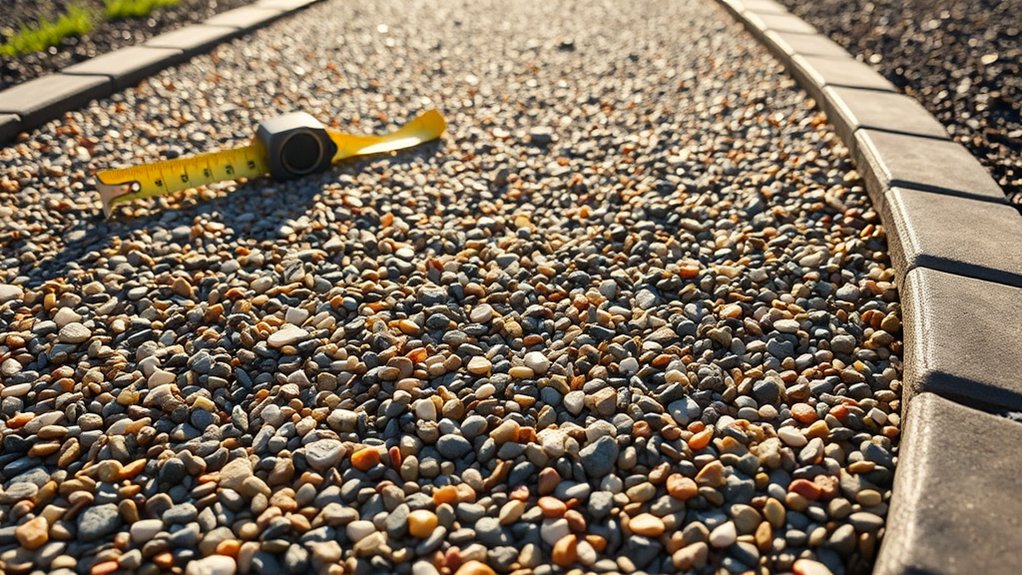
Essential requirements for resin-bound surface installation:
A solid foundation is crucial – the base must be sturdy, stable and completely dry, with no debris or vegetation.
Mix materials using a forced action mixer, maintaining at least 7% resin content by weight (similar to following a precise recipe).
Mark out metre-square grids to ensure even coverage, much like tiling a bathroom floor.
For driveways, lay at least 18mm thick.
Check moisture levels before mixing – this is as important as checking the weather before painting outdoors.
Work swiftly, as the mixture starts setting within 10-15 minutes.
Regular quality checks throughout installation are vital for a professional finish – think of it as checking each stage of a building project.
These steps ensure your resin-bound surface will stand up to British weather and daily use for years to come.
Structural Elements and Their Roles in Durability
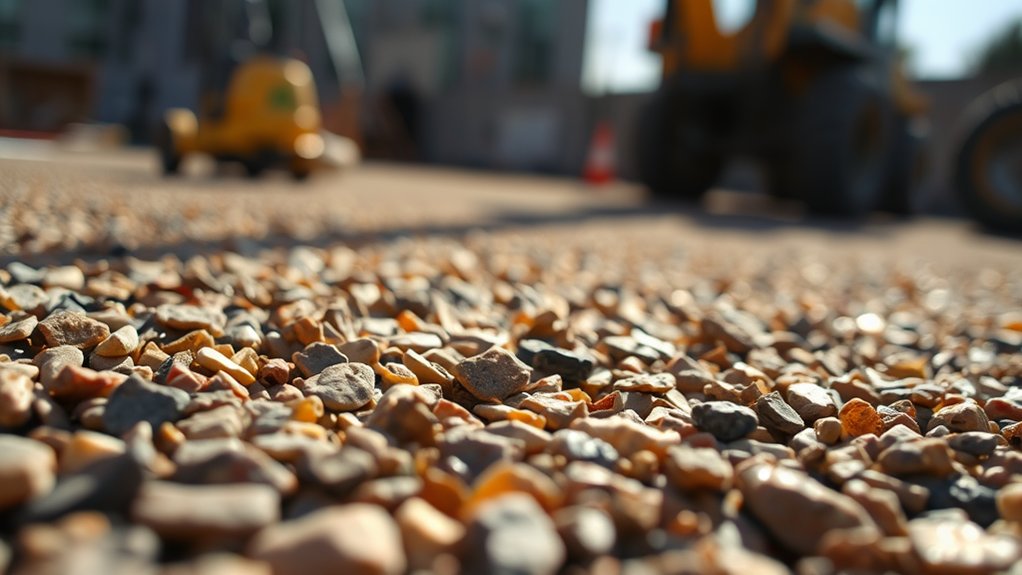
The correct sub-base forms the backbone of any resin-bound gravel system.
A well-compacted MOT Type 1 base provides essential stability and spreads vehicle loads evenly across the ground.
The top layer, mixing resin with chosen aggregates, delivers both strength and visual appeal.
Getting these layers right means the difference between a driveway that lasts 15-20 years and one that fails within months – much like building a house on proper foundations.
Importance of Sub-Base
Importance of Sub-Base
A proper sub-base is crucial for any resin-bound gravel surface. Much like a house needs solid foundations, your resin surface requires a well-built sub-base to prevent sinking and cracking.
MOT Type 3 aggregate makes an ideal choice, as it helps spread weight evenly across the surface – particularly important for driveways where cars will park regularly.
Key points for a quality sub-base:
- Compact thoroughly at each layer
- Build to 100-250mm depth, depending on ground conditions
- Lay a geotextile membrane to stop weeds and add stability
The extra effort spent on sub-base preparation pays off. A properly laid foundation means your resin-bound surface will stay level and crack-free for years to come.
Role of Surface Course
The surface course plays a crucial role in resin-bound gravel installations, working alongside the sub-base to ensure lasting stability. This uppermost layer delivers structural strength, visual appeal and long-term durability through properly chosen aggregates.
| Surface Course Element | Importance | Considerations |
|---|---|---|
| Aggregate Selection | Affects appearance and durability | Range of colours and textures |
| Resin Type | Determines strength and wear resistance | Must match site requirements |
| Thickness | Maintains structural integrity | Minimum 12mm standard |
| Permeability | Essential for SuDS compliance | Proper drainage vital |
| Maintenance Practices | Maximises service life | Regular cleaning needed |
The blend of high-quality aggregates and resin creates a robust, permeable surface that stands up to British weather whilst complementing any property’s aesthetics. Much like choosing the right paint for your walls, selecting appropriate materials for your surface course ensures optimal performance and appearance.
Environmental Considerations for Resin-Bound Gravel
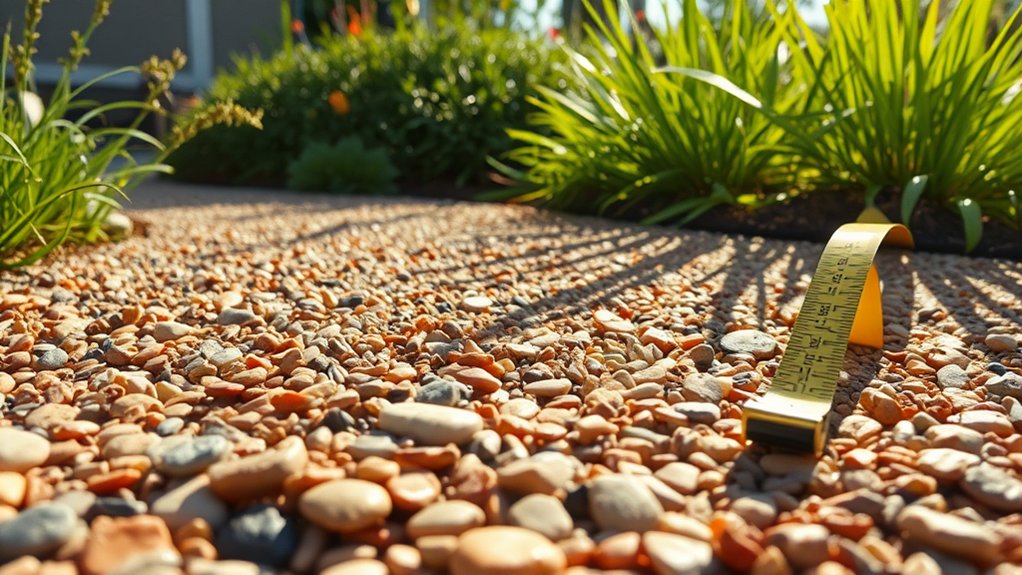
Environmental Impact of Resin-Bound Gravel
Resin-bound gravel systems offer mixed environmental credentials worth considering before installation. These surfaces bring both advantages and challenges to your outdoor space:
Benefits:
- Excellent drainage that reduces localised flooding
- Natural filtration of rainwater back into the ground
- Less puddling and water runoff than concrete or tarmac
Concerns:
- Most binding resins come from petroleum, a non-renewable source
- Worn surfaces can release tiny plastic particles into soil and waterways
- Manufacturing process has a significant carbon footprint
Making it greener:
- Choose suppliers using partially recycled materials
- Opt for UV-stable resins to extend surface life
- Ensure proper installation to prevent premature wear
Whilst resin-bound gravel remains popular for British driveways and paths, weighing these environmental factors helps make an informed choice.
Regular maintenance and quality materials will maximise the system’s lifespan and minimise its environmental impact.
Best Practices and Compliance in the Industry

Best practices for resin-bound gravel installations in the UK centre on quality, safety and compliance. Choose resins that meet FeRFA standards and hold BBA certification – these aren’t optional extras but essential markers of quality.
Mix your resin and aggregate carefully, following exact ratios to get the right consistency every time.
When laying, proper base preparation and correct depth are vital – cutting corners here leads to problems later.
Safety comes first: wear proper PPE when handling diisocyanates, just as you’d on any building site. Think of it like mixing cement – you wouldn’t do that without the right gear.
Regular checks keep standards high, so run quarterly reviews of your methods.
Using recycled aggregates ticks both the sustainability and SUDS compliance boxes – particularly important given UK drainage requirements.
These aren’t just guidelines – they’re the backbone of good installation practice and will save you headaches down the line.
Frequently Asked Questions
What Materials Are Recommended for Resin-Bound Gravel Installations?
Select UV-resistant polyurethane resin for lasting resin-bound gravel installations. Use pre-dried aggregates such as gravel or quartz, ensuring they’re thoroughly clean with no dust. Much like choosing kitchen tiles, pick aggregate sizes and colour combinations that match your property’s style whilst maintaining practical function. Popular UK options include Dorset cream for traditional homes or slate grey for modern builds.
How Often Should Resin-Bound Surfaces Be Maintained?
Resin-bound surfaces require regular upkeep to maintain their appearance and durability. Monthly sweeping removes debris and dirt, whilst occasional pressure washing (2-3 times yearly) keeps the surface clean. Schedule a professional inspection annually to check for any cracks or damage. Think of it like caring for your garden patio – simple, routine attention prevents costly repairs later.
Can Resin-Bound Surfaces Be Installed in Winter?
Resin-bound surfaces can be installed during winter months, but proper temperature checks are essential. Most resin products need specific conditions to cure properly – generally above 5°C. Specialist winter-grade catalysts help manage setting times in cold weather. Just ensure the ground is completely dry and frost-free before starting work.
What Are the Benefits of Using Recycled Aggregates?
Recycled aggregates offer clear advantages for UK construction projects. They reduce expenses, decrease environmental impact and help preserve natural resources. Using these materials supports both practical building needs and sustainable construction practices, whilst helping meet Britain’s waste reduction targets. Common applications include road base materials, concrete production and landscaping projects – all delivering reliable performance at lower environmental cost.
How Do I Choose a Qualified Installer for My Project?
Selecting a proper installer requires thorough vetting. Check their industry credentials, relevant experience and previous work examples. Ensure they hold appropriate UK certifications, such as those from NICEIC or FENSA, depending on your project type. Ask to see their portfolio of similar jobs – for instance, if you need a boiler fitted, look for Gas Safe registration and examples of past heating installations. A qualified professional should readily provide references and proof of insurance whilst following British Standards.
Conclusion
Following regulations for resin-bound gravel is vital for UK installations. Key standards include REACH (chemical safety), SUDS (sustainable drainage), and BBA certification (British Board of Agrément).
These regulations aren’t mere box-ticking exercises – they ensure your driveway or patio will last and drain properly during Britain’s frequent rainfall. For example, SUDS compliance means your surface must allow water to drain naturally, reducing flood risks common in urban areas.
Professional installers must keep up with these standards, as non-compliance can lead to failed inspections and costly repairs. When choosing a contractor, ask about their certifications and understanding of current regulations. Quality installations that meet all standards typically last 15-20 years, proving their worth despite higher initial costs.
